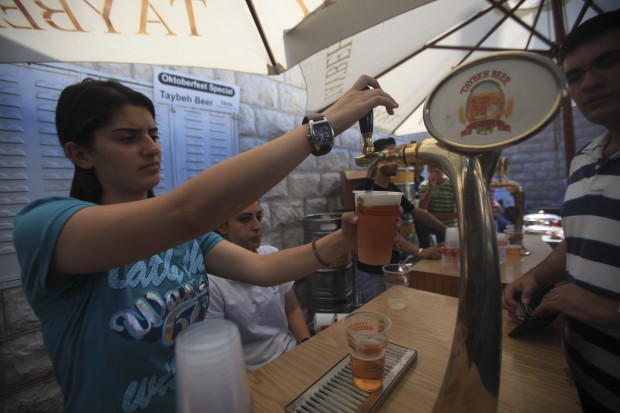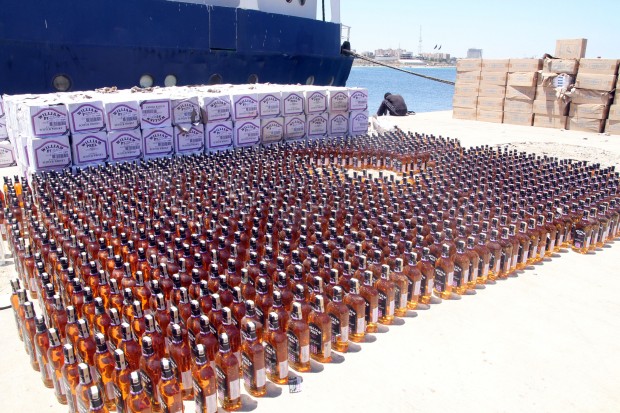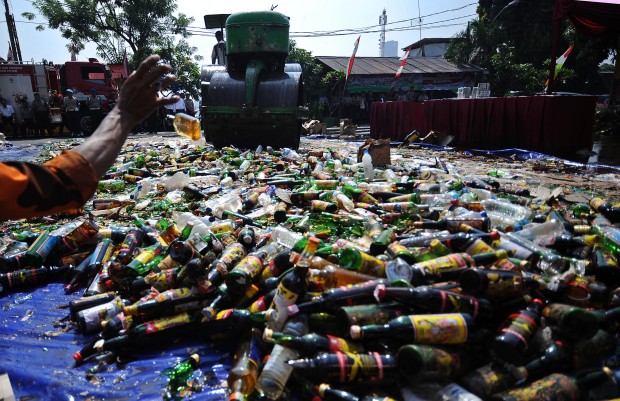Unspeakable taboo: alcohol in Middle East

A Palestinian waitress pours beer during the 15th Taybeh festival, in the West Bank town of Taybeh, near Ramallah, Oct. 3, 2010. The annual festival organized in a Christian village located in a Muslim majority area that widely disapproves of drinking and making alcohol. Taybeh beer is considered the first competitor Palestinian beer in the middle east that has been exported to more than 30 countries in the world. (Xinhua/Fadi Arouri)
Alcohol or liquors are one of the unspeakable taboos around the Middle Eastern countries, with their Muslim majority. Quran prohibits Muslims from drinking alcohol or being intoxicated in any way, but has it always been that way? And does that ever stop them? And who says what’s considered intoxicated and what’s not?
Regular drinker in some Islamic countries protest saying that as long as one stays sober, what’s the harm from drinking a little? That’s the mindset that overcame many Islamic countries over the past years. Since Alcohol now is seeing a tremendous rise in its sell/buy rate, and not all of it can be attributed to non-Muslims or foreigners, as in some countries Muslims themselves are the reason behind the rise in liquor distribution.
Origins of Middle Eastern liquor:
Many historians believe that liquor in its most basic form originated in the Middle East. Many people compare the alcohol ban in Islam to the ban of coffee that occurred during the 16th century, which happened in Egypt and Saudi Arabia with them banning Ethiopian coffee which had its own effect on the human mind, before they finally gave in to the popularity and the pressure of the drink, till it became one of the most noted aspects in both regions. But is coffee similar to alcohol? Is it the same case?
When you try to date liquor back, it goes to caliphates days which were memorize by being written by eighth century poet Abu Nawas in his poems “Khamriyaat” which means “an ode to wine”.
Many people would argue that the description for “intoxicating substance” as mentioned in Quran, might apply to ancient fermented wine, not the modern beer.
Drinking has become a culture in itself, and it shows that rich has taken it to be a lifestyle, even before it was banned. Alcohol was in fact derived from Arabic languages according to historians and many argue that alcohol traveled to Europe later on. Alcohol is derived from the Arabic word “Kohl” which is eyeliners made by mixing distilled ethanol and antimony salts. Similar substances without the powder soon became the popular drinks.

Boxes of wine are piled up in Tripoli harbour on May 30, 2014, in Tripoli, Libya. Libya’s coast guards on Friday showed a batch of alcohol seized during their patrol off coast. Alcohol prohibition is enforced in the Islamic state of Libya. (Xinhua/Hamza Turkia)
The religious ban:
Islam bans any intoxicating substances that may stop people from praying or doing their obligations in life and religion properly. Banning alcohol in Islamic and Middle Eastern countries goes a way back, and currently it’s considered illegal in many countries and looked upon disapprovingly in others.
In some countries it’s legal to drink alcohol like Egypt, where there’s variety of local liquors which the locals and mainly poor people drink in cafeterias or home, and imported wine and liquors which rich drink in hotels and big restaurants, also Lebanon with its wide secular-minded wealthy people who enjoy drinking alcohol, the same goes for Turkey, as there are certain categories in this Islamic countries who enjoy alcohol-drinking on a regular basis.
In other countries alcohol is illegal, like Iran which has some exceptions whom are mainly home brewers and party goers, and the outcome of drinking in Iran is really severe, the same in countries like Pakistan and Saudi Arabia and United Arab Emirates where drinking is highly illegal and despite that can be found in black markets or in big fancy hotels targeting foreigners mainly.
There’s this dilemma of Alcohol being a best-selling item in some of the most illegal countries which is United Arab Emirates as Dubai and Sharjah are known for their wide and extensive variety of alcohol that it has become a destination for foreigner visiting nearby regions for sessions of binge-drinking.
After this, could Islam be tolerant of drinking alcohol? Many people argue that as long you’re staying sober, no harm is done. But one of Al-Azhar’s scholars argue, that such “fatwa” is too dangerous as no religious scholar would dare say that drinking vodka or beer or any other spirits drinks is halal, as mentioned by one of the Economist’s reports. But Muslims managed to find a way around that rule of no drinking alcohol.

Bottles of confiscated illegal alcohol are destroyed in a pre-Ramadan anti-alcohol campaign at a police station in Jakarta, Indonesia, July 8, 2013. In every Ramadan, the holiest month in Muslim calendar, the government conducts raids at unlicensed liquor stores and destroys the liquor in a pubic display. (Xinhua/Zulkarnain)(xzj)
Arabic substitutes for Alcohol:
Arabs found a way to substitute alcohol, with having similar substances which have the same effect on mind the alcohol does. It’s highly illegalized in many of these countries but their markets are widely spread mainly due to the fact that these are cheaper than buying actual alcohol which is considered quite expensive in these countries or in rich’s reach alone.
One of these highly popular substances is “Khat” or “Qat” which is highly used in Yemen. It’s known to have some effects of euphoria and excitement on people eating it, accompanied with some alertness and hyperactivity that can be found in caffeine products. It’s illegal in many countries like Saudi Arabia and Emirates and Malaysia but it’s legal in Yemen, though restricted.
Another plant is “myristica fragrans”, which is found mainly in Iraq and it’s used a little to give food a nice fragrance. But when used extensively it can lead to some hallucinations that it’s constantly compared to weed’s effects. It’s been illegalized and considered “haram” by Islamic scholars. And on the topic of plants, “Poppy” is highly popular in Tunisia, that’s it’s sometimes grown at homes, secretly of course, for its intoxicating effects. It’s illegalized and people get arrested all the time for handling it, but that never stopped them. The examples go on from the highly popular weed in Egypt to “sweeka” or unburned tobacco with some added materials in Sudan and the Gulf, Muslims have their own alternatives of alcohol.





















































